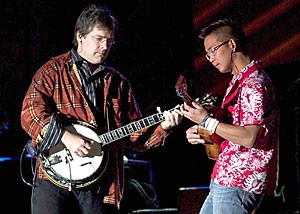For artists, inspiration can take on an array of mediums and often arises in an unpredictable manner. That can certainly be said for the critically acclaimed “”best banjo player in the world,”” BǸla Fleck, who was inspired to pick up the instrument after hearing the theme song to the provincial 60s TV show, “”The Beverly Hillbillies.””
Now, as a tenured player and master of the instrument, Fleck has progressed to drawing inspiration from far more sophisticated sources ranging from avant-garde homemade African instruments to his girlfriend.
In music today, the banjo is often more closely associated with country music than any other genre and therefore seems to carry a stereotype with it, which labels it as an unsophisticated “”red-neck instrument””, indigenous of the South. Contrary to the bias, Fleck has successfully lifted the instrument’s boundaries to new heights, making it a significant player in not only jazz, but bluegrass and rock and roll music as well.
“”Any kind of music can be played on the Banjo,”” Fleck said. “”A lot of people write it off as a hillbilly instrument but it has a really rich tradition.””
With its roots in Africa and the Middle East, the banjo was made popular in early American History through blackface comedy, a form of racist satire where actors would paint their faces black and play the banjo in an effort to mock slaves. Implications though, clearly point to the instrument as having strong ties to African-American culture.
“”The instrument came over on the slave ships and really helped in the creation of jazz music,”” Fleck said.
In an attempt to further explore the history of the instrument, Fleck has recently made his pilgrimage to the instruments homeland, Africa. With his brother as the cameraman, he traveled around the continent exploring the vast musical tradition of the land and while there, recorded multiple records worth of music.
“”I had a great time in Africa,”” Fleck said. “”I was exposed to so many instruments I’ve never seen before and these people were playing them amazingly.””
Aside from his recent pilgrimages and personal endeavors, Fleck can be heard ever so faithfully playing with his longstanding band mates, The Flecktones. The group, formed in 1988, boasts an extremely unique sound that often incorporates Fleck’s banjo with jazz and bluegrass melodies. The band averages 10 to 15 concerts a month throughout the year and is infamous for playing three-hour sets, during which they often captivate their audience through improvs and jam sessions within the show.
“”Everyone in the band knows how to play together,”” Fleck said. “”We know when were supposed to follow and when were supposed to lead, it’s a great situation.””
Growing up, Fleck, named BǸla after Hungarian composer BǸla BartÇük (said to be one of the greatest composers of the 20th century), was exposed to the heady musical uprising of the 60s. Having not acquired a banjo until he was 15, Fleck spent his younger years digesting the music of The Beatles and Joni Mitchell, though he admits he always had a passion for jazz music.
“”I was always a closet jazz player, but I never thought I was actually good enough to do it,”” Fleck said. “”When The Flecktones formed though, I knew it was my chance to give it a try.””
Although the band has come a long way in its 18 years of making groundbreaking music, Fleck seems to still be looking for new ways to pioneer in the future.
“”I think our future will be bright, but you never know: the challenge is not being creative in the same way we’ve always been creative, but being creative in new ways and always being innovative,”” Fleck said.
The Flecktones play at The Fox Theatre, 17 W. Congress St., on Thursday at 8 p.m. All ages; tickets $22 and $30.









